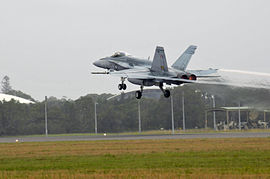RAAF Base Williamtown
| RAAF Base Williamtown | |||||||||||
|---|---|---|---|---|---|---|---|---|---|---|---|

F/A-18 Hornet taking off from RAAF Base Williamtown
|
|||||||||||

The entrance to Fighter World museum
|
|||||||||||
| IATA: NTL – ICAO: YWLM | |||||||||||
| Summary | |||||||||||
| Airport type | Military | ||||||||||
| Owner | Royal Australian Air Force | ||||||||||
| Location | Williamtown, New South Wales, Australia | ||||||||||
| Built | 15 February 1941 | ||||||||||
| In use | 1941–present | ||||||||||
| Elevation AMSL | 31 ft / 9 m | ||||||||||
| Coordinates | 32°47′42″S 151°50′04″E / 32.79500°S 151.83444°ECoordinates: 32°47′42″S 151°50′04″E / 32.79500°S 151.83444°E | ||||||||||
| Website | RAAF Base Williamtown | ||||||||||
| Map | |||||||||||
| Location in New South Wales | |||||||||||
| Runways | |||||||||||
|
|||||||||||
RAAF Base Williamtown (IATA: NTL, ICAO: YWLM) is a Royal Australian Air Force base and headquarters to Australia's Air Combat Group. The base is located 8 nautical miles (15 km; 9.2 mi) north[1] of the coastal city of Newcastle, New South Wales (27 km (17 mi) by road) in the local government area (LGA) of Port Stephens. The military base shares its runway facilities with Newcastle Airport. The nearest towns are Raymond Terrace, located 8 km (5 mi) west of the base and Medowie, 6.8 km (4.2 mi), north of the base, which is home to many of the base's staff.
Contents
History[edit]
RAAF Station Williamtown was established on 15 February 1941 to provide protection for the strategic port and steel manufacturing facilities of the Hunter Region.[2] The base was initially served by four runways, each 1,100 m (3,600 ft) in length to meet the needs of the Williamtown Flying School. The School consisted of 62 buildings which accommodates 366 officers and men.
A number of Australian Empire Air Training Scheme squadrons were formed at Williamtown before proceeding overseas and No. 4 Operational Training Unit was located at Williamtown from October 1942 until the unit was disbanded in April 1944. Following World War II, Williamtown was retained as the RAAF's main fighter base and was equipped with squadrons of Gloster Meteor and F-86 Sabre fighters.[3]
In 1961 the squadron of Meteors were replaced with the Dassault Mirage aircraft.[3] On-base facilities were gradually expanded post war and through until the late 1960s.
In 1983 the role of Williamtown was upgraded to a tactical fighter base in preparation of the replacement of the Mirages with 75 F/A-18 Hornets in 1989. The following year Williamtown became headquarters for the Tactical Fighter group and acquired new headquarter buildings, hangars, workshops, stores, medical facilities and a base chapel.[3]
Present-day[edit]
As of 2009[update] Williamtown employed approximately 3,500 personnel, including military, civilians and contractors, and generated $150 million per annum by way of salaries in the Hunter Region economy.[2]
Williamtown is home to F/A-18 Hornet fighters (operated by No. 2 Operational Conversion Unit, No. 3 Squadron and No. 77 Squadron), BAE Hawk 127 Lead-In Fighters (operated by No. 76 Squadron), E-7A Wedgetail airborne early warning and control aircraft (operated by No. 2 Squadron) and Pilatus PC-9 forward air control aircraft (operated by No. 4 Squadron). It is also home to the Australian Defence Force Warfare Centre[4] and Surveillance and Response Group RAAF.
RAAF Base Williamtown has most of the facilities one would expect to find in a small town, including sporting fields, recreation facilities, cinema and a fortnightly newspaper[5] highlighting activities around the Base and outside community.[citation needed] RAAF Williamtown is the home to Fighter World, a museum dedicated to Australian fighter aircraft.[6]
Units[edit]
Capability Acquisition and Sustainment Group (formerly DMO) Units[edit]
- AEWCSPO – Airborne Early Warning Control System Program Office
- GTESPO – Ground Telecommunications Equipment Systems Program Office
- TFSPO – Tactical Fighter System Program Office
See also[edit]
References[edit]
| Wikimedia Commons has media related to RAAF Base Williamtown. |
![]() This article incorporates public domain material from websites or documents of the Air Force Historical Research Agency.
This article incorporates public domain material from websites or documents of the Air Force Historical Research Agency.
- ^ a b YWLM – Williamtown (PDF). AIP En Route Supplement from Airservices Australia, effective 10 November 2016, Aeronautical Chart page 1
- ^ a b "Government administration and defence" (PDF). Newcastle and the Hunter Region 2008–2009. Hunter Valley Research Foundation. pp. 6–7. Archived from the original (PDF) on 18 October 2009. Retrieved 3 August 2012.
- ^ a b c "RAAF Base Williamtown & Salt Ash Air Weapons Range Williamtown, NSW Heritage Management Plan" (PDF). Department of Defence. 11 September 2009. pp. 32–33. Retrieved 20 April 2010.
- ^ "ADFWC Welcome". Australian Defence Force Warfare Centre. Retrieved 6 September 2015.
- ^ "RADAR Magazine home page". radarnews.com.au. Archived from the original on 25 January 2014.
- ^ "About Fighter World". Fighterworld.com.au. Retrieved 6 September 2015.
- ^ "3 Wing AAFC – NSW & ACT – Australian Air Force Cadets". Australian Air Force Cadets.
